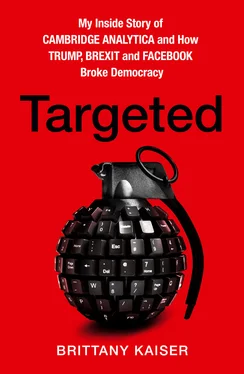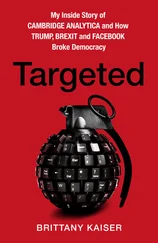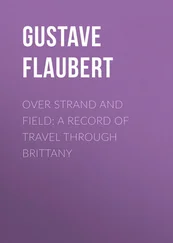I had been particularly proud that the Obama campaign was known for how it segmented its audience, separating them according to the issues they cared about, the states in which they lived, and whether they were male or female. But seven years had elapsed since then. Alexander’s company now went far beyond traditional demographics.
He pulled up a slide that read, “Audience Targeting Is Changing.” On the left was a picture of the actor Jon Hamm as Don Draper, the 1960s Madison Avenue advertising executive from the AMC series Mad Men .
“Old-school advertising in the 1960s,” Alexander said, “is just loads of smart people like us, sitting around a table like this, coming up with ideas like ‘Coca-Cola Is It’ and ‘Beans Means Heinz’ and spending all our clients’ money pushing that out into the world, hoping that it works.”
But whereas 1960s communication was all “top down,” 2014 advertising was “bottom up.” With all the advances in data science and predictive analytics, we could know so much more about people than we ever imagined, and Alexander’s company looked at people to determine what they needed to hear in order to be influenced in the direction you , the client, wanted them to go.
He clicked over to yet another slide. It read, “Data Analytics, Social Sciences, Behavior and Psychology.”
Cambridge Analytica had grown out of the SCL Group, which itself had evolved from something called the Behavioural Dynamics Institute, or BDI, a consortium of some sixty academic institutions and hundreds of psychologists. Cambridge Analytica now employed in-house psychologists who, instead of pollsters, designed political surveys and used the results to segment people. They used “psychographics” to understand people’s complex personalities and devise ways to trigger their behavior.
Then, through “data modeling,” the team’s data gurus created algorithms that could accurately predict those people’s behavior when they received certain messages that had been carefully crafted precisely for them.
“What message does Brittany need to hear?” Alexander asked me, and clicked over to another slide. We need to create “adverts just for Brittany,” he said, looked at me again, and smiled. “Just for the things she cares about and not for anything else.”
At the end of his presentation, he pulled up an image of Nelson Mandela.
Mandela was in my pantheon of superheroes. I had worked with one of his best friends in South Africa, someone who had been imprisoned with him on Robben Island. I had even helped run a Women’s Day event in South Africa for Mandela’s longtime partner, Winnie, but I’d never gotten the chance to shake the hand of the man himself. Now, here he was, right before me.
Alexander said that in 1994, the work SCL did with Mandela and the African National Congress had stopped election violence at the polls. That had affected the outcome of one of the most important elections in the history of South Africa. On the screen was a ringing endorsement from Mandela himself.
How could I not have been impressed?
Alexander had to jump outof the meeting abruptly—something had come up—but he left us in the capable hands of Kieran Ward, who walked us through more of what SCL did.
It had started out running elections in South Africa, and now it ran nine or ten elections each year in places such as Kenya, Saint Kitts, Santa Lucia, and Trinidad and Tobago. Kieran had been on the ground in some of those countries.
In 1998, SCL had expanded into the corporate and commercial world, and after September 11, 2001, it had begun to work in defense, with the U.S. Department of Homeland Security, NATO, the CIA, the FBI, and the State Department. The company had also sent experts to the Pentagon to train others in its techniques.
SCL had a social division as well. It provided public health communications, in case studies where he explained they persuaded people in African nations to use condoms and people in India to drink clean water. It had had contracts with UN agencies and with ministries of health worldwide.
The more I heard about SCL, the more I was taken with it. And when we regrouped and Alexander joined us for dinner at a nearby restaurant, I learned more about him and warmed to him as well.
He had a much broader view of the world than I’d initially thought. He had a degree in art history from Manchester University. After graduating, he had worked in finance at a century-old securities merchant bank in Mexico, a country I loved dearly. He’d gone on to work also in Argentina, then had returned to England, thinking he could make much more of the SCL Group than it currently was—which was more a loose collection of projects than a company, really. He had built it from almost scratch into a mini-empire in just over a decade.
Alexander had loved running elections in the Caribbean and Kenya. And when he mentioned that he had overseen the company’s work in West Africa, I was moved. In Ghana, SCL had undertaken the largest research project on health in that country, and since my own most recent work had been on health care reform in North Africa, we found common ground.
I shared with him what I had been working on, and I told him about some of my work in South Africa, Hong Kong, The Hague, the European Parliament, and for NGOs such as Amnesty International. I still said nothing about my campaign work, and I suppose that hung in the air between us, but I wasn’t ready. Cambridge Analytica was working for the opposition.
Still, I enjoyed the conversation, and next to me, all evening long, Chester boasted so much about my accomplishments that he was a veritable walking, talking recommendation letter.
“Well,” Alexander said when he heard all that I’d done. “A person like you doesn’t wait around for new opportunities, does she?”
I was only half surprisedwhen Chester called the next morning and said that Alexander had gotten in touch with him and asked if he thought I’d be willing to come back in for a formal interview. I knew that Alexander likely had few occasions to meet a young woman like me, not because I was so rare a bird but because of the world in which he lived.
I was a twenty-six-year-old American woman who seemed unafraid to have entered high-stakes, high-testosterone arenas. He had emerged from a closed society of young, privileged men destined to operate in a world of others who looked just like him.
I was of a mixed mind, though, about a job at Cambridge Analytica.
It was exhilarating to understand how such a small company in Britain could be so bold and have such an impact on political systems, cultures, and economies. I was intrigued by the sophisticated technology and its potential to be used for social good. But I was concerned about the company’s current clients in America. How could I not be? I was who I was: a dyed-in-the-wool Democrat.
But I needed a job. A scrappy self-starter, I wasn’t afraid of doing things that might make me money, even if they weren’t my first choice. I’d pushed myself out of my comfort zone at an early age, volunteering on Howard Dean’s 2003 primary campaign bid for the presidency and then on John Kerry’s run when I was only fifteen years old. To support the unpaid work I was passionate about, throughout university in the UK, I’d taken odd jobs, such as training in wine as an in-house sommelier, and less glamorously waited tables—and when really stuck for money, I’d taken bartending and cleaning shifts to remove vomit from the floors of gritty local pubs.
Then, when I was beginning my MPhil/PhD studies in 2012, I leapt to more entrepreneurial endeavors. I started up an events company that put government officials and businesses in conversation with Libyans to discuss how to help stabilize that country in the wake of the Arab Spring. I had gone on to work on a part-time basis as director of operations for a UK trade and investment association that specialized in fostering relationships between the United Kingdom and nations, such as Ethiopia, where it was difficult to do business or easily engage in diplomacy.
Читать дальше












